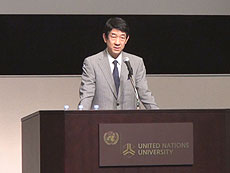Address by Mr. Shintaro Ito, State Secretary for Foreign Affairs
Opening Session, UNU/UNESCO International Conference
"Globalization and Languages"
27 August, 2008, U Thant Hall, United Nations University

Mr. Matsuura, Director-General of UNESCO,
Prof. Osterwalder, Rector of United Nations University,
Distinguished Guests,
Ladies and Gentlemen,
It is a great pleasure for me to attend the opening of UNU/UNESCO International Conference on globalization. I recognize that this gathering has an important agenda, that is, how globalization could bring about benefits to all people on earth. It is a great honor for Japan to provide a forum for the Conference that marks its 6th year.
This year's theme: "Globalization and Languages", is really a timely one. The United Nations General Assembly proclaimed 2008 the International Year of Languages. I am personally very much interested in the issue, because I am a Japanese law-maker, and at the same time, also engaged in an academic study and university teachings in the field related to communication, informatics and civilization.
A language reflects culture and tradition of its people. More importantly, it embodies its people's ways of thinking, as well as their way of feeling and the sense of value. I am sure we all have experiences that when we speak in a foreign language, we often find ourselves trying to adopt the foreign way of thinking and acting. In other words, I think that languages have the power to determine one's way of thinking.
Therefore, the loss of a language has a significant meaning. When deprived of its own language, one has to give up its own way of thinking. If people are forced to use a same language, there will be a uniformity in thinking. If that is to happen, I am afraid that the evolution of our civilization would come to a halt. It is my belief that the civilization can only advance where there is coexistence of different cultures. The variety of cultures give birth to our new wisdom and serves as a foundation for innovative human thinking. Multilingualism is one of the essential elements for further evolution of our common society.
Advanced information technology has accelerated globalization, and the world has become smaller. The increased opportunities for access to information via internet are widely welcomed, as it is expected to benefit the developing countries as well as developed countries. However, the globalization is also posing a threat to multilingualism. As more and more people rely on major languages used on internet today, minority languages are at the verge of disappearance. Indeed, there is a study which warns that more than 50% of 7,000 languages spoken in the world may vanish within decades. Here, I would like to add my voice to Mr Matsuura, who calls upon us to make an urgent action.
Through our history, diversity has created the wisdom of the world which we live in. Diversity also leads to a hope for a brighter future. Therefore, it is not sufficient to preserve the disappearing languages in a museum as if they were historical art pieces, but we must utilize them as active and vibrant tools.
To this end, we need to act with a fresh mind. Unfortunately, I don't have enough time to share my whole idea with you today. I wish I could join the discussions in the following sessions. As that is not possible, it is my sincere wish that this Conference would proceed with this sense of mission, and produce enlightening suggestions to us all.
Finally, I would like to pay my utmost respect to UNU and UNSECO for the vigorous efforts, and would like to reaffirm that Japan continues to be your true partner.
Thank you very much for your kind attention.
Back to Index
